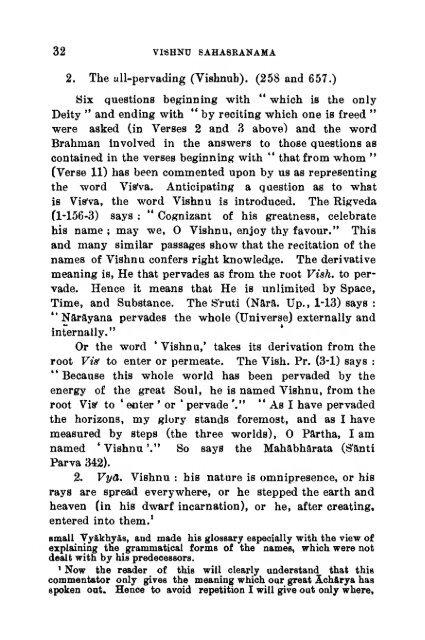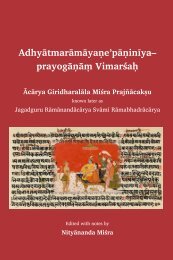Vishnu.Sahasranama.with.the.Bhasya.of.Sankaracharya_text
Vishnu.Sahasranama.with.the.Bhasya.of.Sankaracharya_text
Vishnu.Sahasranama.with.the.Bhasya.of.Sankaracharya_text
You also want an ePaper? Increase the reach of your titles
YUMPU automatically turns print PDFs into web optimized ePapers that Google loves.
32 VISHNU SAHASKANAMA<br />
2. The all-pervading (<strong>Vishnu</strong>b). (258 and 657.)<br />
Six questions beginning <strong>with</strong> " which is <strong>the</strong> only<br />
Deity " and ending <strong>with</strong> " by reciting which one is freed "<br />
were asked (in Verses 2 and 3 above) and <strong>the</strong> word<br />
Brahman involved in <strong>the</strong> answers to those questions as<br />
contained in <strong>the</strong> verses beginning <strong>with</strong> " that from whom "<br />
(Verse 11) has been commented upon by us as representing<br />
<strong>the</strong> word Vis'va. Anticipating a question as to what<br />
is Vis'va, <strong>the</strong> word <strong>Vishnu</strong> is introduced. The Rigveda<br />
(1-156-3) says : " Cognizant <strong>of</strong> his greatness, celebrate<br />
his name ; may we, <strong>Vishnu</strong>, enjoy thy favour." This<br />
and many similar passages show that <strong>the</strong> recitation <strong>of</strong> <strong>the</strong><br />
names <strong>of</strong> <strong>Vishnu</strong> confers right knowledge. The derivative<br />
meaning is, He that pervades as from <strong>the</strong> root Vish. to per-<br />
vade. Hence it means that He is unlimited by Space,<br />
Time, and Substance. The S'ruti (NSra. Up., 1-13) says :<br />
" Narayana pervades <strong>the</strong> whole (Universe) externally and<br />
internally."<br />
Or <strong>the</strong> word ' <strong>Vishnu</strong>,' takes its derivation from <strong>the</strong><br />
root Visf to enter or permeate. The Vish. Pr. (3-1) says :<br />
" Because this whole world has been pervaded by <strong>the</strong><br />
energy <strong>of</strong> <strong>the</strong> great Soul, he is named <strong>Vishnu</strong>, from <strong>the</strong><br />
root Vis' to ' enter ' or ' pervade '." " As I have pervaded<br />
<strong>the</strong> horizons, my glory stands foremost, and as I have<br />
measured by steps (<strong>the</strong> three worlds), Partha, I am<br />
named ' <strong>Vishnu</strong> '." So says <strong>the</strong> Mahabharata (S'anti<br />
Parva 342).<br />
2. Vyd. <strong>Vishnu</strong> : his nature is omnipresence, or his<br />
rays are spread everywhere, or he stepped <strong>the</strong> earth and<br />
heaven (in his dwarf incarnation), or he, after creating,<br />
entered into <strong>the</strong>m. 1<br />
small Vyakhyas, and made his glossary especially <strong>with</strong> <strong>the</strong> view <strong>of</strong><br />
explaining <strong>the</strong> grammatical forms <strong>of</strong> <strong>the</strong> names, which were not<br />
dealt <strong>with</strong> by his predecessors.<br />
1 Now <strong>the</strong> reader <strong>of</strong> this will clearly understand that this<br />
commentator only gives <strong>the</strong> meaning which oar great iLcharya has<br />
spoken oat. Hence to avoid repetition I will give out only where,



